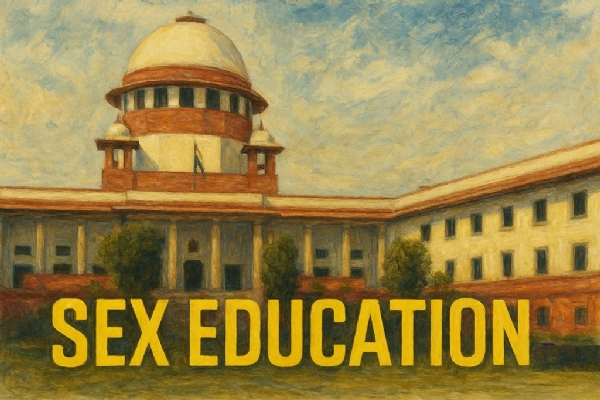
Dr. Mayank Chaturvedi
The Supreme Court of India recently made an observation that has stirred deep reflection across the nation. A bench comprising Justice Sanjay Kumar and Justice Alok Aradhe noted that sex education should not begin in Class IX but at a much earlier age. The court made this remark while hearing a case involving a 15-year-old boy accused of a sexual offence. Its view: children should be made aware of the biological changes in their bodies and the responsibilities associated with them before they reach puberty.
On the surface, the observation seems progressive and timely; a step toward awareness and safety. Yet, it has opened a profound debate: in a civilization as deeply rooted in values and restraint as India’s, is it appropriate to expose children to sex education at such an early stage? Will it cultivate awareness or ignite a new kind of social imbalance?
India’s Cultural Framework: Morality Before Curiosity
Indian society rests on a moral foundation distinctly different from the West. Here, life has traditionally been divided into four objectives; Dharma (righteousness), Artha (livelihood), Kama (desire), and Moksha (liberation). Among these, restraint, discipline, and Brahmacharya (celibacy) are emphasized as the preparatory stage of life.
Children are raised within a framework of values where modesty, respect, and moral boundaries are central. The ideal youth, according to Indian tradition, was expected to observe celibacy until the age of twenty-five and only then enter the household stage. Within such a value system, the idea of introducing sex education during childhood appears discordant, if not contradictory.
If young students are taught about contraception, sexual relations, or “consensual relationships” too early, the instruction may not remain confined to information; it may arouse curiosity and a desire to experiment. Psychology consistently shows that early exposure to a subject increases both curiosity and the impulse to experience it. This is where society’s apprehension lies.
The Western Experience: Awareness or Erosion?
Sex education has been a part of school curricula in Europe and the United States for over five decades. The objective was identical to what India’s Supreme Court now envisions; protecting children from unsafe sexual practices and unwanted pregnancies. Yet, the results have often been paradoxical.
Britain, for instance, has one of the highest teenage pregnancy rates in the world, particularly among girls under fifteen. In Sweden, Norway, and the Netherlands, teenage motherhood has become so commonplace that state governments are now raising the children of teenage parents.
The core issue is not information but the absence of restraint and accountability. When children are told that “safe methods exist,” they begin to believe that experimentation is not wrong. Such reasoning has corroded the moral and social fabric of several Western nations. The lesson is clear: education without responsibility leads to moral confusion, not empowerment.
Potential Pitfalls in India’s Context
Introducing sex education at a very young age in India carries serious risks. The first and foremost is the normalization of premature relationships. Open discussions about contraception, consent, and sexual behavior in classrooms are bound to stimulate curiosity and experimentation. This may disrupt school discipline and erode the essential decorum between teachers and students.
It may also deepen the cultural discomfort within families. For most Indian households, lajja (modesty) and sankoch (reserve) are integral to moral upbringing. When schools begin discussing sex in open terms, the moral codes of the home and the lessons of the classroom are likely to collide. Parents will find themselves uncertain about how to guide their children in this new moral landscape.
Knowledge Must Walk with Values
Opposing early sex education does not mean endorsing ignorance. Information is essential, but so is moderation in how and when it is given. Adolescents should certainly be taught about the biological changes that accompany puberty, yet such education must be interwoven with cultural and moral guidance.
If sex education is reduced merely to biology or contraception, it risks creating confusion rather than clarity. It must therefore be part of moral education, where children are taught that sexual relations are not just physical acts but also moral, emotional, and social responsibilities. Awareness without ethics can never serve the cause of civilization.
A Clash with Cultural and Religious Ethos
In Indian tradition, Kama (desire) is recognized as one of life’s legitimate pursuits, but it is meant to operate within the boundaries of Dharma and Maryada (propriety). Premarital relations are discouraged because the moral foundation of Indian society is built upon the sanctity of the family.
To teach twelve- or fourteen-year-old children about “consensual relationships” would directly challenge this civilizational ethic. Such a move risks accelerating moral decline and destabilizing the family system. While the Supreme Court’s intent may be to free children from ignorance and misconception, the broader social and cultural implications of its observation cannot be ignored. This subject demands deeper deliberation.
Is India Ready for This Leap?
In most Indian homes; particularly in rural and semi-urban areas, sex remains a subject shrouded in discomfort. If children are told in classrooms that “sexual relations are natural” or that “contraception ensures safety,” they may face inner conflict. This cognitive dissonance can distort their understanding of morality and lead to a generation detached from its ethical roots.
The Supreme Court’s intent to promote awareness is indeed noble. Yet every noble intent must align with the cultural sensitivities of the society it aims to serve. The West acted hastily and witnessed the consequences; India cannot afford to replicate that error.
This nation stands on the triad of family, culture, and restraint. Weakening these pillars will only shake the social equilibrium. In the Indian context, therefore, introducing sex education before Class IX seems neither necessary nor prudent. One hopes that the Supreme Court will revisit this delicate issue with greater cultural and psychological depth before taking it forward.
---------------
Hindusthan Samachar / Mayank Chaturvedi






